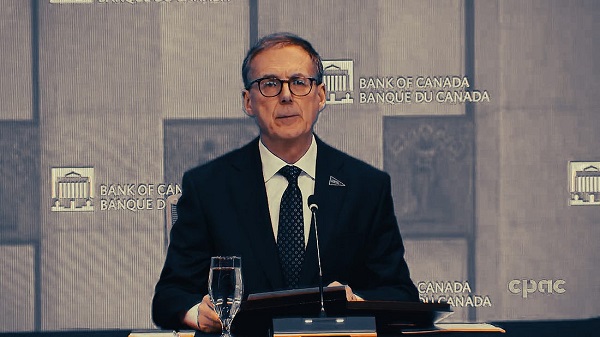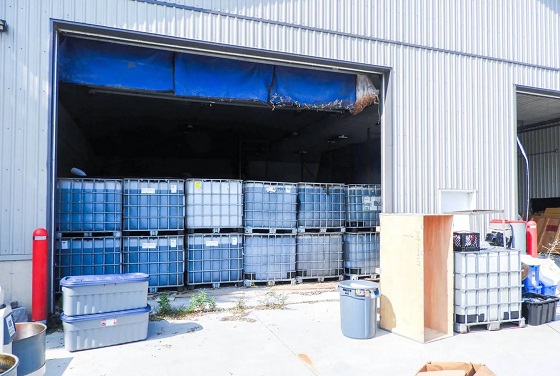Crime
Canada Seizes 4,300 Litres of Chinese Drug Precursors Amid Trump’s Tariff Pressure Over Fentanyl Flows

In what appears to be the second-largest Chinese precursor-chemical seizure in British Columbia in the past decade, Canadian border and police officials announced they intercepted more than 4,300 litres of chemicals used to manufacture fentanyl and other synthetic drugs at a notoriously troubled port in Delta, B.C.
The announcement of a seizure that occurred in May 2025 comes amid President Donald Trump’s continuing pressure on Ottawa to crack down on fentanyl trafficking in the province — which U.S. officials say has become a key production and shipment point for Chinese and Mexican traffickers.
The seizure — announced jointly by the Canada Border Services Agency (CBSA) and the RCMP — underscores the scale and persistence of global trafficking networks funnelling illicit materials into Canada’s drug markets.
According to the agencies, border officers examined two marine containers that arrived from China in mid-May, both bound for Calgary, Alberta. Acting on intelligence developed by CBSA’s Pacific Region, officers discovered 3,600 litres of 1,4 Butanediol, a key ingredient for producing GHB, often known as the “date-rape drug”; 500 litres of Propionyl Chloride, a chemical precursor used to synthesize fentanyl; and 200 litres of Gamma Butyrolactone (GBL), another controlled intoxicant.
The chemicals were concealed inside 60 clear jugs and 20 blue drums within the containers. Investigators believe the shipment was intended for use in clandestine drug laboratories. The RCMP confirmed that an investigation into the importation network remains ongoing.
The seizure comes amid growing concern about Canada’s port security, particularly in Metro Vancouver, where experts and local officials say criminal networks are exploiting gaps in federal enforcement.
The Delta seizure follows a series of major CBSA operations targeting precursor chemicals at Pacific ports. In May 2022, CBSA officers in the Metro Vancouver District examined a container from China declared as “toys” and discovered 1,133 kilograms of the fentanyl-precursor chemical Propionyl Chloride, with the potential to produce more than a billion doses of fentanyl.
Public Safety Canada also reported that in the first half of 2021, CBSA seized more than 5,000 kilograms of precursor chemicals, compared with just 512 kilograms in 2020 — reflecting what officials called a “dramatic escalation” in attempts to smuggle fentanyl inputs into the country.
In 2023, the City of Delta released a report highlighting major vulnerabilities at port terminal facilities, warning that there is “literally no downside” for organized criminals to infiltrate port operations. The report noted that British Columbia’s provincial threat assessment rated ports as highly susceptible to corruption and organized-crime infiltration.
At the time, Delta Mayor George Harvie called the lack of a dedicated national port-policing force “a threat to national security.” In comments to the Canadian Press, Harvie said that while Canada’s ports fall under federal jurisdiction, the “total absence of uniformed police at the facilities makes them obvious targets for criminal elements — from Mexican drug cartels to biker gangs.”
“We’re witnessing a relentless flow of illegal drugs, weapons and contraband into Canada through our ports, and that threatens our national security,” Harvie said.
The Port of Vancouver complex, which includes major terminals in Delta, Surrey, and Vancouver, handles roughly three million containers annually, with millions more expected as port expansion plans move forward.
The Delta report reiterated how difficult it has become to police these sprawling operations since the Ports Canada Police were disbanded in 1997. More than a quarter-century later, Harvie said, the consequences of that decision are now “alarmingly clear.”
The CBSA announcement today comes as U.S. President Donald Trump has imposed tariffs on Canadian exports, accusing Ottawa of failing to interdict the flow of fentanyl and precursor chemicals trafficked through British Columbia ports. Washington has repeatedly pressed Canada to strengthen port enforcement and anti-money-laundering controls, citing the West Coast’s role in China- and Mexico-linked trafficking networks.
Simultaneously, in trade negotiations with Beijing, Mr. Trump announced a reduction in tariffs tied to the fentanyl supply chain — raising concern that Washington has eased pressure on China, the primary source of finished fentanyl now responsible for hundreds of thousands of overdose deaths across North America.
Subscribe for free to receive new posts and support my work.
For the full experience, please upgrade your subscription and support a public interest startup.
We break international stories and this requires elite expertise, time and legal costs.
Crime
Suspect caught trying to flee France after $100 million Louvre jewel robbery

French authorities have arrested two men accused of involvement in the recent heist at the Louvre Museum that stunned Paris last week. One of the suspects was caught Saturday night at Charles de Gaulle Airport as he tried to board a flight to Algeria, French outlet Le Parisien reported. Both men, described as being in their 30s and from Seine-Saint-Denis — a crime-ridden suburb north of Paris — were taken into custody on charges of “organized gang robbery” and “conspiracy to commit a crime.” Two other members of the crew remain on the run.
Authorities say the arrests followed a tip that one suspect was attempting to flee the country. Police intercepted him at the airport, while a second man was tracked down hours later in Paris. Investigators have yet to recover any of the stolen Crown Jewels. The four-man gang — clad in yellow vests and motorcycle helmets — used a cherry picker to scale the walls of the Louvre’s Apollo Gallery before smashing glass displays with chainsaws in front of stunned onlookers. The entire operation reportedly took less than four minutes.
The thieves made off with eight pieces from France’s historic Crown Jewels collection, including a sapphire diadem, necklace, and earring linked to 19th-century Queens Marie-Amélie and Hortense. Among the most valuable items taken were Empress Eugénie’s diamond diadem and a massive diamond-and-emerald corsage brooch. One piece — Eugénie’s emerald-set imperial crown with over 1,300 diamonds — was later found outside the museum, damaged but recoverable. The crew abandoned and torched the cherry picker before escaping on scooters.
Forensic teams have since gathered more than 150 DNA, fingerprint, and hair samples from the scene and other sites across Paris. One key piece of evidence — hair found in a motorcycle helmet — is believed to belong to the first thief who entered the museum. Investigators suspect the men were experienced criminals hired to carry out the robbery for a private buyer.
The suspects are being held at Paris police headquarters, where they can be detained for up to 96 hours before charges are formally filed. Interior Minister Laurent Nuñez praised police for their swift action, writing on X: “I extend my warmest congratulations to the investigators who have worked tirelessly as I requested and who have always had my full confidence… We keep going!!”
In the wake of the heist, France’s government has ramped up security at major cultural sites. The remaining Crown Jewels have been moved to an ultra-secure vault at the Bank of France. A forthcoming audit by France’s Court of Auditors reportedly found that the Louvre’s video surveillance systems were woefully outdated — with security spending in 2024 lower than two decades earlier.
Paris prosecutors, however, criticized the media for leaking details about the arrests. “This revelation can only hinder the investigative efforts of the 100 or so mobilised investigators… It is too early to provide any specific details,” said prosecutor Laure Beccuau.
“French-crown-jewels” byMichael Reeve licensed under CC BY-SA 3.0 DEED.
Alberta
Coutts border officers seize 77 KG of cocaine in commercial truck entering Canada – Street value of $7 Million

News release from RCMP Federal Policing Northwest Region
Calgary resident charged with attempted drug importation
Canada Border Services Agency (CBSA) officers at the Coutts port of entry found nearly 77 kg of cocaine with an estimated street value of $7 million during a secondary examination of a commercial truck seeking entry into Canada from the United States. The CBSA arrested the driver, a resident of Calgary.
The Integrated Border Enforcement Team in Alberta, a joint force operation between the RCMP Federal Policing Northwest Region, CBSA and Calgary Police Service, was notified and a criminal investigation was initiated into the individual.
Surj Singh Salaria (28), a resident of Calgary, was arrested and charged with:
- Importation of a controlled substance contrary to section 6(1) of the Controlled Drugs and Substances Act;
- Possession of a controlled substance for the purpose of trafficking contrary to section 5(2) of the Controlled Drugs and Substances Act; and,
- Attempting to export goods that are prohibited, controlled or regulated contrary to section 160 of the Customs Act.
Salaria is scheduled to appear in Lethbridge Provincial Court on Oct. 27, 2025.
“The CBSA remains vigilant in preventing dangerous drugs from reaching our communities. This significant seizure shows CBSA’s detection capabilities and the important role our officers play to stop drug trafficking. We are committed to securing and protecting the border alongside our law enforcement partners.”
- Janalee Bell-Boychuk, Regional Director General, Prairie Region, Canada Border Services Agency
“Through coordinated efforts between law enforcement agencies, a substantial quantity of cocaine was seized before it could reach communities across Alberta. This investigation reinforces the value of a secure border and the vital role that collaboration and intelligence-sharing play in safeguarding the public from the harms of illegal drug trafficking.”
- Supt. Sean Boser, Officer in Charge of Federal Serious and Organized Crime and Border Integrity – Alberta, RCMP Federal Policing Northwest Region
“This investigation highlights the strength of our collaborative efforts through the Integrated Border Enforcement Team. By working together with our law enforcement partners, we are able to disrupt the flow of illegal drugs and protect our communities from the violence and harm associated with organized crime.”
- Acting Supt. Jeff Pennoyer, CPS, Criminal Operations & Intelligence Division
IBET’s mandate is to enhance border integrity and security along the shared border, between designated ports of entry, by identifying, investigating and interdicting persons, organizations and goods that are involved in criminal activities.
-

 National1 day ago
National1 day agoCanadian MPs order ethics investigation into Mark Carney’s corporate interests
-

 Business2 days ago
Business2 days agoFord’s Liquor War Trades Economic Freedom For Political Theatre
-

 Banks2 days ago
Banks2 days agoBank of Canada Cuts Rates to 2.25%, Warns of Structural Economic Damage
-

 Bruce Dowbiggin20 hours ago
Bruce Dowbiggin20 hours agoGet Ready: Your House May Not Be Yours Much Longer
-

 Alberta1 day ago
Alberta1 day agoNobel Prize nods to Alberta innovation in carbon capture
-

 Business2 days ago
Business2 days agoBill Gates walks away from the climate cult
-

 MxM News1 day ago
MxM News1 day agoTrump ‘Grateful’ For Bill Gates Pivot, Declares Victory Over ‘Climate Change Hoax’
-

 Internet2 days ago
Internet2 days agoMusk launches Grokipedia to break Wikipedia’s information monopoly





